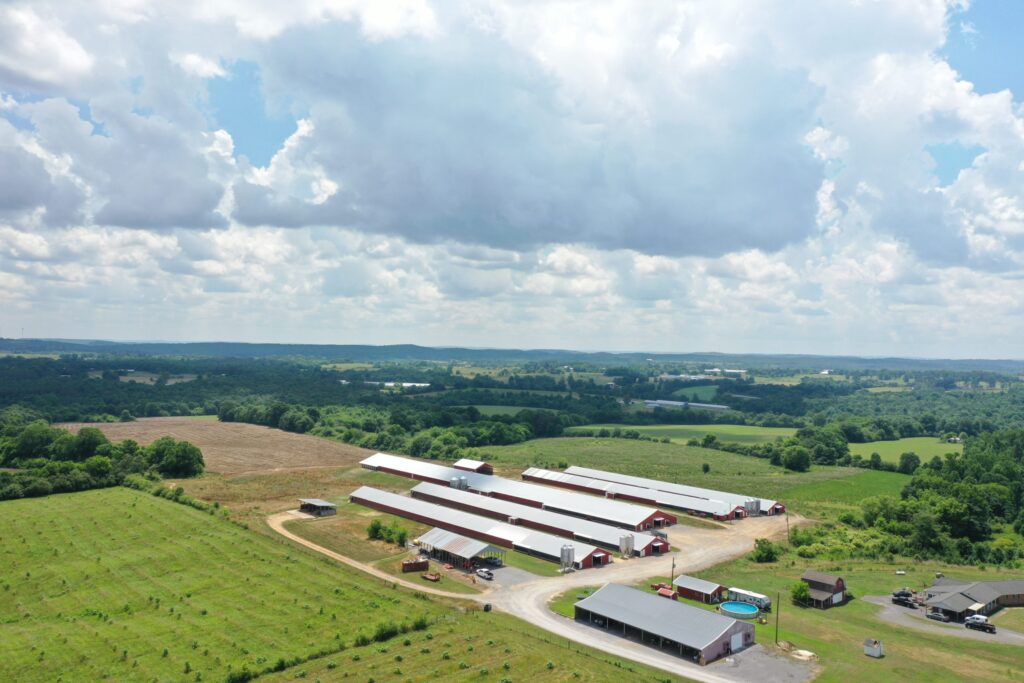
Alabama farm valuations are determined through a thorough assessment that takes into account historical trends, legal mandates, economic impacts, productivity metrics, tax consequences, and various land value factors. These valuations play a vital role in shaping agricultural investment decisions, rural development, property tax assessments, and land use planning in the state. Understanding the multifaceted aspects influencing farm valuations provides a holistic view of the significance and implications underlying these assessments.
Key Takeaways
- Influence agricultural investment decisions and tax assessments.
- Reflect land quality, location, and economic conditions.
- Impact rural development, financial health, and property taxes.
- Guide land use planning and conservation efforts.
- Ensure fair taxation based on objective data and recognized techniques.
Historical Context of Farm Valuations
In examining the historical context of farm valuations in Alabama, it is essential to trace the evolution of valuation methods and their impact on agricultural practices. Historically, farm valuations in Alabama have been influenced by various factors such as changes in agricultural technology, market demands, and government policies. In the early days, farm valuations were often based on simple methods like land size and crop yields. However, as agriculture became more mechanized and specialized, valuation methods evolved to take into account factors like machinery value, livestock inventory, and even intangible assets like water rights.
The evolution of farm valuations in Alabama has had a significant impact on agricultural practices. Farmers have been incentivized to adopt modern techniques and technologies to increase the overall value of their farms. Additionally, changes in valuation methods have also influenced land use patterns, with a shift towards more profitable or sustainable farming practices. Understanding this historical context is vital for evaluating the current state of farm valuations in Alabama and for predicting future trends in agricultural development.
Legal Requirements for Valuations
Legal regulations governing farm valuations in Alabama establish specific criteria and standards that must be followed by agricultural appraisers. These regulations are designed to guarantee fairness, accuracy, and consistency in the valuation process. One key requirement is that appraisers must consider the market value of the land, taking into account factors such as location, soil quality, topography, and access to utilities. Additionally, appraisers must have a thorough understanding of state laws and regulations related to property assessments.
Furthermore, Alabama law mandates that farm valuations must be based on objective data and sound valuation methods. This means that appraisers cannot rely on subjective opinions or speculation when determining the value of agricultural properties. Instead, they must use recognized appraisal techniques such as the income approach, sales comparison approach, and cost approach to arrive at a fair and accurate valuation.
Economic Impact of Valuations
The economic implications of farm valuations in Alabama can greatly impact agricultural investment decisions and overall rural development initiatives. Accurate valuations play a pivotal role in determining the financial health of farms, influencing decisions on expansions, acquisitions, or diversifications. Investors and lenders rely on these valuations to assess the feasibility of funding agricultural projects, with higher valuations often indicating a more attractive investment opportunity.
Furthermore, farm valuations affect property tax assessments, impacting the revenue generated for local governments and services. A fair and precise valuation system guarantees that farmers contribute equitably to the community while also receiving necessary support for their operations. Additionally, these valuations can influence land use planning and conservation efforts, guiding sustainable development practices within the agricultural sector.
In essence, the economic impact of farm valuations extends beyond individual farm owners, shaping the broader rural economy and community well-being. By providing a foundation for informed decision-making and resource allocation, valuations contribute to the overall stability and growth of Alabama's agricultural sector.
Agricultural Productivity Metrics Used
Farm valuations in Alabama are closely tied to the agricultural productivity metrics used to assess the efficiency and performance of farms in the region. To determine the value of farms accurately, several key metrics are considered:
- Crop Yields: The amount of crops produced per acre is a fundamental measure of farm productivity. Higher crop yields indicate efficient farming practices and can positively impact the overall farm valuation.
- Livestock Production: The number of livestock raised and sold by a farm is another essential metric. Factors such as weight gain, reproduction rates, and health indicators are assessed to determine the farm's productivity in this area.
- Input-Output Ratios: Analyzing the relationship between inputs (such as labor, seeds, fertilizers, etc.) and outputs (crop yields, livestock products) helps evaluate the farm's efficiency in utilizing resources. Farms with high output relative to input are often valued more favorably.
Taxation Based on Valuations
How are tax assessments influenced by farm valuations in Alabama? Tax assessments in Alabama are directly impacted by the valuations assigned to farms. The value placed on a farm determines the property taxes that the owner will be required to pay. Generally, the higher the valuation of the farm, the more taxes the owner will owe. This places importance on accurate and fair farm valuations to guarantee that property taxes are levied correctly.
| Tax Assessment Impact | Description |
|---|---|
| Higher Valuation | Results in increased property taxes |
| Lower Valuation | Leads to decreased property tax amounts |
| Accurate Valuation | Guarantees fair taxation for farm owners |
Factors Influencing Land Values
In considering land values, various factors play a significant role in determining the overall valuation of farms in Alabama. The following are key factors that influence land values in the state:
- Location: The proximity to markets, availability of transportation infrastructure, and access to essential services all impact land values. Farms located near urban areas or major highways tend to have higher valuations due to easier access to resources and markets.
- Land Quality: The fertility of the soil, drainage, and topography are essential determinants of land values. High-quality land that is suitable for a variety of crops or livestock production typically commands higher prices.
- Economic Conditions: The overall economic environment, including factors such as crop prices, interest rates, and government policies, can have a significant impact on land values. Strong commodity prices and favorable economic conditions generally lead to higher farm valuations.
Understanding these factors is essential for farmers, investors, and policymakers to make informed decisions regarding agricultural land in Alabama.
Future Trends in Farm Valuations
Amid changing market dynamics and technological advancements, the trajectory of agricultural land values in Alabama is poised to undergo significant changes in the coming years. One key trend expected to influence farm valuations is the increasing adoption of precision agriculture. This technology-driven approach allows farmers to optimize their operations by utilizing data analytics, GPS technology, and remote sensing to make informed decisions about crop management, irrigation, and resource allocation. As precision agriculture becomes more widespread, farms that embrace these innovations may see an increase in their land values due to higher productivity and efficiency.
Another future trend likely to impact farm valuations is the growing focus on sustainability and environmental stewardship. Consumers are becoming more environmentally conscious, leading to a rise in demand for sustainably produced agricultural products. Consequently, farms implementing sustainable practices such as conservation tillage, cover cropping, and organic farming may experience an uptick in land values as they align with market preferences and regulatory requirements. Overall, as the agricultural sector continues to evolve, these emerging trends are set to redefine the criteria for determining and establishing farm valuations in Alabama.
Frequently Asked Questions
What Are the Primary Challenges Faced by Farmers in Alabama When It Comes to Determining the Value of Their Farms?
Primary challenges faced by farmers in Alabama when determining farm values include fluctuating market prices, varying land quality, changing regulations, and lack of access to accurate data. These factors complicate the valuation process.
How Do Advancements in Technology and Data Analytics Play a Role in Modern Farm Valuations?
Advancements in technology and data analytics revolutionize modern farm valuations by enabling precise data collection, analysis, and forecasting. Integration of tools like drones, GPS, and AI enhances accuracy and efficiency in determining farm values.
Are There Specific Government Programs or Incentives Available to Farmers in Alabama to Help With Farm Valuations?
Government programs and incentives in Alabama aim to support farmers with farm valuations. These programs can provide financial assistance, tax incentives, and resources to help farmers accurately determine the value of their agricultural assets and make informed decisions for their operations.
How Do Environmental Factors, Such as Climate Change and Natural Disasters, Impact Farm Valuations in Alabama?
Environmental factors like climate change and natural disasters can greatly impact farm valuations in Alabama. Droughts, floods, and extreme weather events can damage crops, affect yields, and lead to increased production costs, ultimately influencing the overall value of farms in the state.
What Role Do Local Market Trends and Consumer Demand Play in Influencing the Value of Farms in Alabama?
Local market trends and consumer demand are pivotal in shaping the value of farms in Alabama. Understanding these factors enables farmers to align their production with market needs, optimize profitability, and stay competitive in the agricultural industry.
Conclusion
In summary, the valuation of farms in Alabama plays a pivotal role in evaluating the economic worth of agricultural land and properties. It is essential for taxation purposes and reflects the productivity and market value of the agricultural sector. Various factors such as crop yields, land quality, and market demand influence these valuations. Understanding the historical context and legal requirements surrounding farm valuations is vital for ensuring fair and accurate appraisals in the future.
